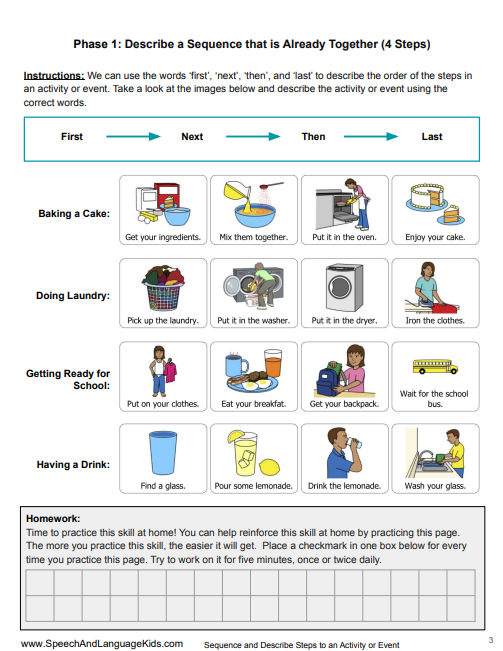Speech Therapy Games for Kids | Sequencing, Following Directions, and Other Language Skills
Children learn through play.
Speech therapy games can be a great way to help kids learn language skills such as sequencing, following directions, asking and answer questions, and more!
On this page, we’ll show you our favorite speech therapy games to play with kids to help them learn language skills such as sequencing, following directions, and more!
Speech Therapy Games for Sequencing:
When children are having a hard time telling a story or retelling a past event, they may be struggling with sequencing. Sequencing is our ability to put the steps to something in order.
Here are a few fun game ideas for working on sequencing with children.
Speech Therapy Games for Following Directions:
Speech therapy games can also be helpful for teaching a child to follow directions! Start simply, with one-step directions that they are familiar with. As they become more confident with the games, you can work your way up to less familiar directions and even multi-step directions!
- Treasure Hunt Steps: Give 2–4 verbal directions to find a hidden object (“First go to the couch, then look behind the cushion, last bring it to me”).
- Simon Says in Order: Give a single command or a series of commands (“Simon says hop, then spin, then freeze”) and the child has to complete them in sequence.
- Animal Command Game: Call out actions as animals—“Hop like a bunny,” “Stomp like an elephant,” then grow it into sequences (“Stomp like an elephant, then slither like a snake”).
- Red Light, Green Light Remix: Start with basic stop/go, then add new “lights” with specific directions (“Yellow means hop,” “Blue means spin before you stop”).
Need some therapy materials for this one? We have a pre-made Curriculum for Following Directions as well! It includes all of the visual aids and therapy materials you need to teach a child to follow single and multi-step directions.
Speech Therapy Games for Asking and Answering Questions:
We can use games to help a child learn to ask and answer questions as well.
- Silly or Not? Say something goofy (“Is a banana purple?”) and the child answers yes/no; gradually mix in real questions.
- What Am I Doing? Act out an action (jumping, pretending to eat) and ask “What am I doing?”
- What’s Missing? Hide your hands behind your back and bring out a silly pose (“What am I making with my hands?”).
- Where Did It Go? Hide behind a piece of furniture or behind your hands and ask “Where am I?” as the child searches.
- Story Questions: Tell a tiny 1-sentence story (“The dog ran to the park”) and ask quick questions: what, where, why, when—just one at a time so it stays fun!
Don’t worry! We have a full Curriculum for Asking and Answering Questions as well!
Structured Curriculums for Speech Therapy:
Stop wasting time cobbling together random activities.
Children make faster progress when skills are taught with a structured, systematic approach.
Our Language Curriculums are waiting for you right now!
At the click of a button, you’ll have simple, structured lessons for weeks to come.

About the Author: Carrie Clark, MA CCC-SLP
Hi, I’m Carrie! I’m a speech-language pathologist from Columbia, Missouri, USA. I’ve worked with children and teenagers of all ages in schools, preschools, and even my own private practice. I love digging through the research on speech and language topics and breaking it down into step-by-step plans for my followers.
Connect with Me:




I can’t get it to download. It sates Failed-Network error. Thanks.
I’m sorry you’re having trouble! I’ve found that many schools block my download emails. I’ve emailed you the game but in the future you may want to have those sent to a personal email address if you have one or try downloading it at home. Thanks!
I’m not able to get the sequencing game download. All the other ones are coming through except for this one.
Hi, Marisol-
Here is the link for the Sequencing Game. Please let us know if you need anything else.
Same here I can’t download the images…pls tell me what are other ways to avail them thank you
Yup! Just email me at carrie@speechandlanguagekids.com
For some reason these aren’t being sent to my personal inbox. Would you be able to email them to me? 🙂 Thanks!
Please email me at Carrie@Speechandlanguagekids.com and let us know what you need!
I have trouble downloading either. Already shot you an email. Thanks for you hard work Carrie. 🙂
I think there’s something wrong with your site. I’ve requested the link to multiple private email addresses and have not received anything. I also sent an email to the above address. No response yet.
Hi, Mia-
I am so sorry you were not able to receive your requested download. I have just sent it to you via email. If you do not receive it, please email us directly at speechandlanguagekids@gmail.com. We’d be more than happy to resend it to you.
please send the sequencing board & cards to Boodletick2@yahoo.com
Hi, Jill-
Did you receive these materials or did you still need them emailed to you?
Hi….
I’m having trouble getting the sequencing and directions free resource from you….
Could you send me a copy to siana.taylor@ntlworld.com
Thank you
Hi, Siana-
I’ve emailed you the requested materials to both emails you have provided. Please let me know if you stil don’t receive them.
Hi there thank you so much for your website it is full of helpful stuff. Would you please kindly send me this to Angel.lampa@yahoo.com thanks in advance
Hi, Angel-
This has been emailed to you.
Same problem here. Haven’t received anything.
Hi, Amber-
Here is a direct link for the Sequencing Game. If you still cannot get it to download, please email us at speechandlanguagekids@gmail.com.
~Kena
Hi, I could not download this one particular activity either 🙁 I absolutely loves your activities:)
Thank you!
Hi, Laurie-
This has been emailed to you.
~Kena
Hi, Kindly mail me to lakmi19@yahoo.com. Thank you
Hi, Lakmi-
I have sent this to via email to you.
~Kena
Hi! could you also send me this game. yanazaychenko06@icloud.com thanks.. so sweet of you
Hi, Yana-
Sure! Here is the link for the game.
hello, I cannot download this cards.
diaz4810@brighthouse.com
Hi, Yolymar-
I’m sorry you were not able to download the game. Can you try using this link?
Hi, I am not able to download this. Tried several times, but no link is coming to my e-mail address. Please help.
Hi, Monalisa-
So sorry to hear you did not receive you link. Here it is!
I am a paying member but can’t get to the log in page to access the materials.
Hi, Chelsey-Please try using this updated URL when logging in: https://www.slpsolution.com/pediatric/. If you continue to have trouble logging in, please email us at support@slpsolution.com.
Hi, I am not able to download this. Tried several times, but no link is coming to my e-mail address. Please send me on naziya4irshad@gmail.com
Thanks in advance
Hi, Irshad-We have emailed you a copy of the requested resources. Please let us know if you need anything further.
So, I joined. I followed the directions to input the password, then tried to download the Free Sequencing cards but it just kept shuttling me back to the page to join. This is very frustrating! I am an SLPA student and want to use it for a project this week. Please Help!
Hi, Kelly-Please check your inbox when you get the chance. We’ve sent a copy of the resource you requested.
I am not able to download- my email is teachersamuel2020@gmail.com
Hi, Sheena-Please check your inbox, as we have emailed a copy of the requested resource to you.